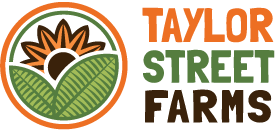Taylor Street Farms community garden is located behind the Little Italy Branch of the Chicago Public Library at the intersection of Ada & Arthington streets. The garden features over 70 garden beds, a picnic area with an arbor, a community tool shed, floral gardens along the perimeter, an apiary for bees, and the Taylor Street Prairie.
Because of its extensive sustainability features, the farm is the first community garden in Chicago and Cook County to earn Conservation@Home status by the Forest Preserves of Cook County.

Garden Plots
Available for rent on a first-come first-serve basis, Taylor Street Farms has over 70 raised-bed garden plots suitable for growing small amounts of fruits and vegetables. Each plot-renter makes a commitment to grow organically without the use of pesticides or synthetic fertilizers. A few plots are dedicated to growing food for local food shelters, and Taylor Street farms regularly donates produce to Breakthrough Urban Ministries during the growing season. Farmers do not sell any produce, and the garden funds its operations through membership dues and in-kind donations.
Community & Environmental Benefits
Taylor Street Farms beautifies the neighborhood and offers a calm and peaceful respite for the community to gather. The opportunity for people to grow their own food allows them to offset the cost of fresh produce as it provides enhanced food security. The transformation of an unused city lot into a garden reactivates the space in a lively manner, and the improvements to the soil through organic gardening can potentially remediate the ground beneath it, improving soil, air and water quality. Lush vegetation that surrounds the garden can cool the air, reducing the urban heat island effect that often results from the absorption of solar heat by hardscape surfaces such as asphalt and concrete.
Community & Environmental Benefits
Taylor Street Farms beautifies the neighborhood and offers a calm and peaceful respite for the community to gather. The opportunity for people to grow their own food allows them to offset the cost of fresh produce as it provides enhanced food security. The transformation of an unused city lot into a garden reactivates the space in a lively manner, and the improvements to the soil through organic gardening can potentially remediate the ground beneath it, improving soil, air and water quality. Lush vegetation that surrounds the garden can cool the air, reducing the urban heat island effect that often results from the absorption of solar heat by hardscape surfaces such as asphalt and concrete.
Taylor Street Apiary
Established in 2019 by Alvéole, an organization that installs and cares for beehives at businesses and schools, the Taylor Street Apiary houses bee frames (hives) to maintain an active colony of pollinating bees. As a visitor to the farm you will witness busy honeybees at work collecting pollen from the abundance of flowers at the farm. Bees produce honey from a mixture of pollen and nectar, which are stored in cells made of wax. Wildflower honey has a wonderful flavor that varies considerably more than store-bought, and the wax can be used to make environmentally-friendly personal-care products, candles and much more.
Taylor Street Prairie
Located on the north outer-border of the farm is the Taylor Street Prairie, a naturalized area filled with tall and showy native wildflowers and grasses. The plants in this area are native to the Chicago region, which was once 90% tall-grass prairie. A prairie is a well-balanced community of wildflowers, grasses, insects and other animals. Today, most prairies are gone, but remnants of the prairie community can still be found along right-of-ways, in suburban forest preserves, and in small conservation areas like Taylor Street Farms. Learn more about the ecosystem.
Taylor Street Prairie
Located on the north outer-border of the farm is the Taylor Street Prairie, a naturalized area filled with tall and showy native wildflowers and grasses. The plants in this area are native to the Chicago region, which was once 90% tall-grass prairie. A prairie is a well-balanced community of wildflowers, grasses, insects and other animals. Today, most prairies are gone, but remnants of the prairie community can still be found along right-of-ways, in suburban forest preserves, and in small conservation areas like Taylor Street Farms. Learn more about the ecosystem.
Compost and Soil Piles
Natural ecosystems never produce waste. As an organic farm, composting allows gardeners to constantly replenish their beds with fresh soil, much of which is produced onsite. Over several months, plant and landscaping debris is broken down by fungi and bacteria, and the result of this decomposition is soil! Soil from natural compost is rich in nutrients that plants need to grow, and retains moisture well. Soil and compost piles also provide habitat for numerous beneficial insects that pollinate flowers but require underground burrows in loose soil for their reproductive and food storage needs.

















